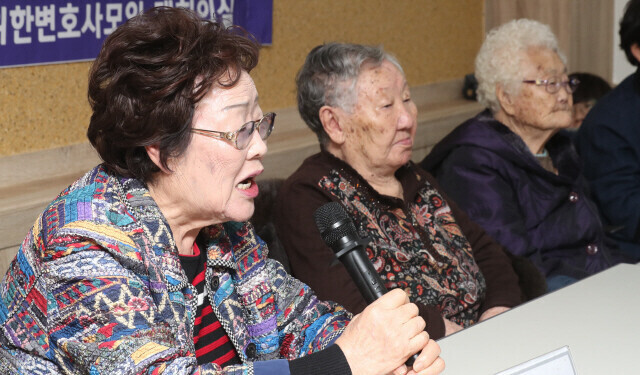hankyoreh
Links to other country sites 다른 나라 사이트 링크
Japan welcomes S. Korean court’s dismissal of “comfort women” lawsuit

After a South Korean court dismissed a damages lawsuit filed against Japan by “comfort women” survivors, Japan underlined the court’s recognition of the principle of “sovereign immunity” as well as its affirmation of the comfort women agreement concluded by South Korea and Japan in December 2015.
“It was appropriate to recognize sovereign immunity on the ‘comfort women’ issue,” the Yomiuri Shimbun, a Japanese newspaper, said in an editorial in its Thursday edition.
Japanese Foreign Minister Toshimitsu Motegi welcomed the ruling in an appearance before the Diet the previous day. “I think this ruling [about sovereign immunity] is appropriate if it’s based on the Japanese government’s position,” Motegi said.
Sovereign immunity is a principle in customary international law under which the sovereign actions of one country cannot be adjudicated in another country.
The Yomiuri Shimbun also mentioned that the South Korean court had described the 2015 comfort women agreement as a step taken by the Japanese government to remedy the harm suffered by the former comfort women. “It’s unusual for the South Korean courts to credit actions by Japan,” the newspaper said.
As for why the most recent court ruling contradicted an earlier one, Japanese analysts suggested that the court had been influenced by South Korean President Moon Jae-in’s comments in a January press conference about being “perplexed” by the earlier ruling, in which the court ordered the Japanese government to compensate the comfort women survivors.
“It’s possible that [Moon’s remarks] affected the ruling,” said Tadashi Kimiya, a professor at the Graduate School of Arts and Sciences at the University of Tokyo, in an interview with Kyodo News. Kimiya’s specialty is South Korean politics and diplomacy.
There are also reports that the Japanese government had been ready to summon South Korean ambassador Kang Chang-il, assuming that the court would rule against Japan.
“Vice Foreign Minister Takeo Akiba had finished preparations to summon Kang in protest immediately after the ruling,” reported the Asahi Shimbun, another Japanese newspaper.
While this comfort women lawsuit may have been dismissed, analysts don’t think that South Korea-Japan relations are likely to improve anytime soon.
South Korea’s Supreme Court has yet to rule on a case involving Koreans conscripted for forced labor during World War II, and the earlier ruling awarding damages to the comfort women survivors still has to make its way through the courts.
“All this means is that South Korea-Japan relations didn’t take another hit. The situation remains grave,” a senior official in Japan’s Foreign Ministry said in an interview with the Mainichi Shimbun, another Japanese newspaper.
By Kim So-youn, staff reporter
Please direct comments or questions to [english@hani.co.kr]

Editorial・opinion
![[Editorial] Does Yoon think the Korean public is wrong? [Editorial] Does Yoon think the Korean public is wrong?](https://flexible.img.hani.co.kr/flexible/normal/500/300/imgdb/original/2024/0417/8517133419684774.jpg) [Editorial] Does Yoon think the Korean public is wrong?
[Editorial] Does Yoon think the Korean public is wrong?![[Editorial] As it bolsters its alliance with US, Japan must be accountable for past [Editorial] As it bolsters its alliance with US, Japan must be accountable for past](https://flexible.img.hani.co.kr/flexible/normal/500/300/imgdb/original/2024/0417/6817133413968321.jpg) [Editorial] As it bolsters its alliance with US, Japan must be accountable for past
[Editorial] As it bolsters its alliance with US, Japan must be accountable for past- [Guest essay] Amending the Constitution is Yoon’s key to leaving office in public’s good graces
- [Editorial] 10 years on, lessons of Sewol tragedy must never be forgotten
- [Column] A death blow to Korea’s prosecutor politics
- [Correspondent’s column] The US and the end of Japanese pacifism
- [Guest essay] How Korea turned its trainee doctors into monsters
- [Guest essay] As someone who helped forge Seoul-Moscow ties, their status today troubles me
- [Editorial] Koreans sent a loud and clear message to Yoon
- [Column] In Korea’s midterm elections, it’s time for accountability
Most viewed articles
- 1[Column] The clock is ticking for Korea’s first lady
- 2Samsung barricades office as unionized workers strike for better conditions
- 3[Editorial] When the choice is kids or career, Korea will never overcome birth rate woes
- 4[News analysis] After elections, prosecutorial reform will likely make legislative agenda
- 5Why Israel isn’t hitting Iran with immediate retaliation
- 6S. Korea, Japan reaffirm commitment to strengthening trilateral ties with US
- 7[Editorial] Does Yoon think the Korean public is wrong?
- 8[Guest essay] How Korea turned its trainee doctors into monsters
- 9[Editorial] 10 years on, lessons of Sewol tragedy must never be forgotten
- 10Strong dollar isn’t all that’s pushing won exchange rate into to 1,400 range